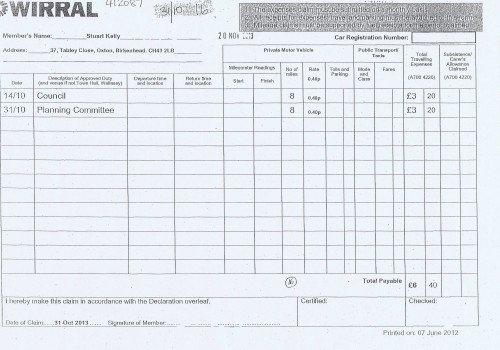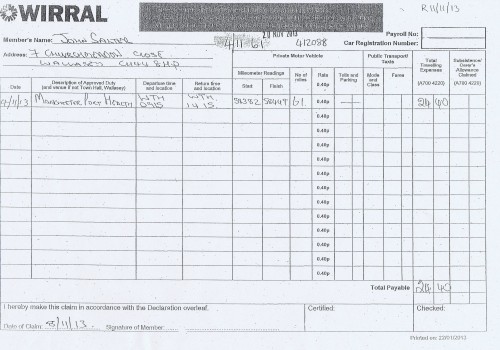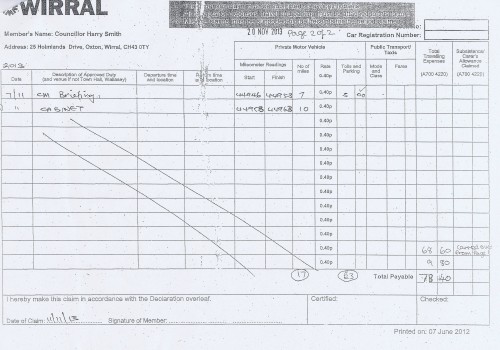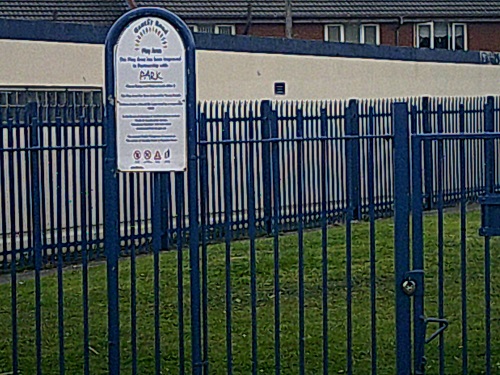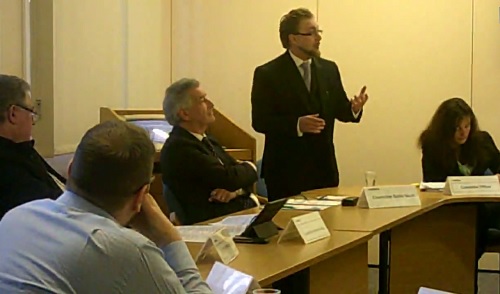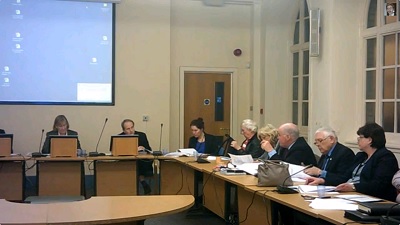The meeting that no longer exists: Martin Morton’s Grievance Appeal
If you check Wirral Council’s website for meetings on held on the 2nd July 2007, you’ll find details of two other public meetings scheduled for that day, but not the Appeals Sub-Committee meeting to consider a grievance hearing.
The grievance hearing started on 23rd May 2007 (that meeting was adjourned to the 2nd July 2007).
However until now it hasn’t been widely known what happened at the meeting on the 2nd July 2007. Although the notes below taken by the committee clerk of the meeting are heavily redacted, they hopefully give a flavour as to what happened at the meeting itself.
NOTES
APPEALS SUB-COMMITTEE – 2 JULY 2007
GRIEVANCE APPEAL – MR MARTIN MORTON
Present: Councillors G Ellis
H Smith
P Williams (appointed as Chair for this meeting)
In attendance: P Bradshaw, Head of Human Resources
C Hughes, Assistant Borough Solicitor
B Ellis, Senior Committee Officer
K Miller, Director of Adult Social Services
T Ryan, Principal Manager, HR, Adult Social Services
Mr & Mrs Martin Morton
Mr Morton referred to the previous meeting of the Sub-Committee when his grievance appeal was adjourned to enable:-
(a) The Director of Adult Social Services to provide his written replies to the appellant’s original grievances, which were not contained in his replies to the appellant’s questions of 17 January 2007.
(b) The appellant to have an opportunity to reply in writing to the Director’s responses to the outstanding grievances.
Mr Morton commented that he had only received the agenda and paperwork for the appeal hearing today on 29 June, and this placed him at a disadvantage in preparing his response. However, he didn’t want to request a further adjournment. He had taken advice and was prepared to proceed without legal representation.
Mr Morton presented a written statement setting out the basis for his appeal (copy attached).
The Chair asked Mr Morton what he hoped to achieve from today’s hearing.
Mr Morton said that he wanted his allegations to be investigated by an external body. He had asked for this in his letter to Steve Maddox, Chief Executive. However, he was not satisfied with the response and wanted an Audit Commission investigation.
C Hughes advised that the Sub-Committee needed to hear this case first.
Mr Morton said that he wanted time to prepare his written response to K Miller’s letter dated 29th June 2007.
C Hughes reported that K Miller had other commitments but his staff could respond to Mr. Morton’s questions. The Director had also provided a detailed written submission.
Mr Morton called his first witness, (name blacked out), former Unit Manager for (organisation blacked out).
M Morton (MM) asked (name blacked out) for (initials blacked out) views on the way in which (initials blacked out) concerns about (organisation blacked out) (initials of organisation blacked out) were dealt with by the Adult Social Services Department and the impact on their clients.
Question:
MM – “Did you give a statement expressing concern about (initials blacked out)? – Did you maintain contact with me after you left the organisation?”
Answer:
Yes.
(initials blacked out) commented “other staff also had concerns”.
Question:
MM – “Have you written to K Miller regarding these issues?”
Answer:
“Yes, but I am still awaiting for a response from the Director, and the outcome of a meeting held in 2005.”
MM asked (initials blacked out) to detail some of her concerns:-
(i) (name blacked out) (an 80 year-old (blacked out) – Service Manager called at (initials blacked out) home to collect money
(ii) Incidents involving the withholding of client’s money
(iii) Health and Safety issues.
MM referred to an internal departmental meeting held on 16th June 2005, when these concerns were raised and reported that some of the complainants who had attended this meeting were either sacked or had left under duress. He was trying to raise the profile of their concerns about (blacked out).
K Miller (KM) stated that MM was making allegations and presenting them as fact and he resented this on a personal level because they were defamatory statements.
He pointed out that the grievance procedure was about employment conditions.
KM stated that MM had presented information about the practices of another organisation which he fully accepted. His department’s approach in addressing these issues was being undertaken in conjunction with the Commission of Social Care inspections.
KM said that MM was looking for an external inquiry into the care practices of (initials blacked out). He pointed out that the contracting procedure with external organisations was a separate issue and not a matter for today’s grievance hearing.
(name blacked out) said that statements had been given to the police regarding the practices of the external organisation.
C Hughes (CH) referred to the terms of reference for the grievance hearing and asked MM for an indication regarding his treatment by Adult Social Services when he had raised these concerns.
KM reported that these concerns were matters for the police not the regulatory body – Commission for Social Inspection. His department was trying to address these concerns without de-stabilising client’s living arrangements.
(name blacked out) pointed out that (initials blacked out) was never employed by Wirral.
MM called his second witness: (name blacked out) – Manager for a company providing services for adults with learning disabilities. (initials blacked out) had previously worked for (initials blacked out).
(initials blacked out) had worked for (initials blacked out) for over a year as manager of a twelve-bed unit. (initials blacked out) said that (initials blacked out) had seen practices that were abusive emanating from top management. (initials blacked out) had raised these matters with a social worker and “whistle-blew”. The police were involved and a service user was interviewed. (initial blacked out) had reported the abuse to (name blacked out), social worker and (initials blacked out) had instigated action.
KM said that he was prepared to accept that these were legitimate concerns. He referred to the protection of vulnerable adults list – which records people who are unsuitable to work in this field. t was a national register kept by the Home Office.
MM reiterated that these concerns were not dealt with adequately or effectively by the department and they were not taken seriously enough.
(name blacked out)(initials blacked out) asked (initials blacked out) if (initials blacked out) had instigated action against staff who had abused residents.
(initials blacked out) said that (initials blacked out) service manager was involved and other people who were abusive were senior to (initials blacked out) in the (initials blacked out) organisation.
(initials blacked out) had taken (initials blacked out) to a Tribunal for wrongful dismissal and had won (initials blacked out) case at the Tribunal.
MM commented that this was evidence in support of his statement that there were serious concerns.
MM called his third witness, (name blacked out), Supported Living Officer.
(initials blacked out) reported that he was a registered social worker with responsibility for assisting people in finding suitable accommodation. MM was (initials blacked out) line manager and (initials blacked out) had worked closely with him and observed him at work on a daily basis.
(initials blacked out) said that MM had an open and sharing way of working and when the team had expanded from two to six people he encouraged team members to share information and bring forward their own ideas.
(initials blacked out) said there was no criticism of MM’s style of management and no criticism regarding his approach to staff in the department.
(initials blacked out) said that (initials blacked out) had regular supervision and training.
MM asked (initials blacked out) for (initials blacked out) views on MM’s response to criticism.
(initials blacked out) said there was sometimes criticism from other teams regarding completion of forms but MM always treated this in a professional way. (initials blacked out) reiterated that MM was always open to change and always acted in a professional way.
(initials blacked out) was asked about (initials blacked out) period of sick leave from September 2005 to May 2006. (initials blacked out) said that (initials blacked out) had received good support from the department at this time, with phone calls from (initials blacked out) and home visits from (name blacked out).
(initials blacked out) commented further on the role and responsibilities of MM’s team. (initials blacked out) said that there were difficulties regarding lack of direction regarding the role of the team, and they had therefore developed their own role. MM’s role was to facilitate the relationship between housing providers and social services, develop partnerships with other agencies and build up a relationship with them. Their role in supported housing was to find property for social services’ clients to enable them to have their own tenancy agreements.
(initials blacked out) asked (initials blacked out) the following questions:-
(i) “Have you ever been bullied at work?” Answer “No”.
(ii) “(name blacked out) was appointed as your line manager in October – have you any grievance against your line manager at the moment?” Answer “No”.
(iii) “What level of support did you receive when you were on sick leave?” – Answer – “Good” (see earlier note).
(iv) “Could you elaborate on the comment “MM was on his knees”? – MM responded by saying that the appointment process had taken six months and MM had already managed the team for twenty months and there was a further period of six months before a new team leader appointment was made.
Councillor Ellis referred to (initials blacked out)’s period of sick leave and asked if things had changed while (initials blacked out) was away from work. He asked (initials blacked out) for further clarification as to the reasons why MM’s grievances had not been satisfied, i.e. what is it that the Council hasn’t done?
(initials blacked out) responded by saying that MM had raised issues around the accreditation process and senior managers in the department were disregarding what he was saying. Other people also felt that their opinions were being ignored. In his position as Supported Living Development Officer, MM was one of the few people visiting external providers’ buildings and he could therefore see things “first hand”. In his opinion, clients weren’t getting the services that they needed.
CH asked for specific examples where MM’s advice was being ignored by senior management.
Answer: “MM’s advice was generally about particular organisations. With regard to (initials blacked out) he was giving advice on the accreditation process”.
CH asked for an example of the criteria that wasn’t accepted by senior managers.
(initials blacked out) responded by saying that certain companies who did not meet the criteria were still being included in the accredited list.
CH asked if it was part of MM’s responsibility to decide which companies were selected for inclusion in the list.
Answer: “Initially, yes, but MM had withdrawn from the selection process because he wasn’t being listened to”.
CH asked for clarification regarding the way in which MM’s advice was being ignored.
Councillor Smith asked (initials blacked out) for (initials blacked out) views as to why MM’s advice should be accepted when there were other people in the department who were equally knowledgeable in this area of work.
(initials blacked out) replied by saying that MM knew more about supported living than other people.
MM reported that he had devised an application form and contract document with (blacked out) Project Officer, and an accreditation process for checking the forms that were returned. He said that he would comment verbally on the letter from KM dated 29 June 2007. His comments covered four main areas:-
(1) National policy regarding supporting people. MM emphasised that it was not his aim to change Government policy and he acknowledged that this matter was outside his control. However he was allowed to challenge and criticise some of the department’s decisions and circumvent the allegation that he did understand the the contractual constraints which the department was working under.
(2) Application of that policy locally regarding supported living providers.
MM said that he had serious concerns about some providers, which amounted to a serious default by the department. There was no evidence that (blacked out) and (blacked out) were “Fit for Purpose”.
(blacked out) were assessed as not being “Fit for Purpose”. He was being asked to collude with poor practice by agreeing to their inclusion on the accredited list.
MM referred to his discussions with (black out) Adult Protection Co-ordinator and reported that her line manager, Mark Jones, did not support the view that Adult Services should do business with (blacked out).
MM referred to allegations regarding bad practice which applied to the (blacked out).
CH advised that the hearing today could not consider fresh grievances and that they would have to go through the normal process.
MM commented on the statement “This brings me to my concern over the insight you have over processes that need to be followed”. He pointed out that he had set up the accreditation process and therefore fully understood the way in which it should work.
(3) The way the organisation listened to you and the way it supported you in terms of conflict with those providers.
MM reported that he had been called a “dogsbody” in a departmental meeting and professionally humiliated in front of other people. He had also been excluded from Partnership meetings.
MM reported that he had been threatened with violence by a service user and his response to this situation had resulted in a complaint, which went to stage 1 of the Complaints Procedure. There were other examples of malicious complaints made against MM and he felt that he wasn’t supported by the department in looking at the reasons behind these complaints. He felt there was too much emphasis in the Director’s letter of him not accepting criticism, e.g. “your view seems to be that no-one should be allowed to criticise you and the department is at fault for not stopping it”.
Councillor Ellis said that officers could reasonably expect a certain amount of criticism from service users as part of their job.
MM referred to his attendance at a meeting with Maura Noone, when he was called a “Dogsbody”.
He commented that the Director seemed to regard this as an acceptable comment “in any work environment there is an element of the throwaway comment”.
The meeting was adjourned for a lunch break.
(4) Job Role
MM said that he had maintained an impossible workload for a long time and that the department had used his goodwill in covering the team manager’s role. He had done this on Grade PO6 but the new post of Adult Team Manager was now graded PO8. The comments about him being given the opportunity to apply for post of General Adult Team leader were irrelevant. He commented on the wording in the Director’s letter “had raised his profile within the department” and said that this showed a lack of insight as to what motivated him to do his job. He pointed out that he had never been subject to disciplinary or capability issues.
The offer of a sideways move was a recurring theme in the Director’s letter but redeployment was not a resolution to his grievance. He also had an issue with comments by the Director about his attitude “a more reasonable attitude”. He resented this criticism and suggested it could be reflected back to senior managers.
Resolution
He was still concerned about the exist strategy that DASS were intending to deploy in relation to (blacked out)
(c) His concerns about contingency plans in relation to tenants within (blacked out) were set out in pages 22/23 of his Bundle.
(d) He had noted that the philosophy and strategy in relation to the future direction of supported living was unchanged, but his job role had changed and he had no job description. His original post had been deleted from the establishment.
(e) There was evidence to support his perception of lack of respect, e.g. name calling and being excluded from meetings.
MM said that he would provide a written response to the above issues.
(blacked out) reported that (blacked out) had been appointed to the post of General Adult Team Manager and that the grade of the post had been changed to PO8. He asked MM if supervision had taken place, and did he discuss training opportunities. MM reported that it was a requirement of the General Social Work Council with effect from 1 April 2004 that he must provide evidence of 15 days or 90 hours of approved training in order to maintain his social work registration.
MM acknowledged that he had infrequent supervision meeting with Mrs Sheila Finnegan-Jones, Service Manager, but was asked to concentrate on work-related tasks.
(blacked out) reported that the training requirements included an element where social work staff could develop their own training requirements.
Councillor Smith had noted that training issues were not raised with Mrs Finnegan-Jones and that discussions had centred on work-related areas. He asked MM if he had highlighted the requirement to discuss training issues in his discussions with Mrs Finnegan-Jones.
Councillor Williams pointed out that Mrs Finnegan Jones had taken note of her discussions with MM regarding training.
Councillor Ellis asked if Mrs Finnegan-Jones had worked through a training checklist and asked MM to identify any issues that he wanted to raise.
MM said that he had never received a copy of these notes.
Councillor Ellis pointed out that these were formal supervision meetings and staff were notified in advance to enable them to identify any relevant issues for the ensuing discussion.
MM acknowledged that there was a prescribed form for the session but it had never been used. He had asked for copies of the notes from these sessions but had never received them.
MM reported that there was a requirement for a twelve-monthly key issues exchange. He had never had a KIE but by that time he was disillusioned with the department and had not pursued this matter.
CH referred to the importance of KIE, the purpose of which was to bring such issues to the attention of managers.
Councillor Ellis asked MM if he could agree that the department had attempted to resolve his grievance – Answer “No.”
MM referred to a number of issues relating to the effect of the heavy workload and the strain on his health in pursuing his grievances, the way in which the process was conducted, and the suggestion by the department that redeployment provided an answer to these problems.
Councillor Ellis asked for further clarification concerning MM’s frustration with national policies.
MM said that he was more concerned about practice issues and the way these policies impact on Wirral.
Councillor Ellis pointed out that the Director was ultimately responsible for the implementation of these national policies.
MM said that some practice issues were untenable and he was therefore allowed to make these criticisms.
Councillor Smith stated that the purpose of the supervisory sessions was to devise a strategy to overcome some of these problems.
(blacked out) highlighted the following points in his opening remarks:
- MM had 14 years local government service and currently held the post of Support Living Development Officer on grade PO6
- In July 2006, Sheila Finnegan-Jones, Service Manager, had received an e-mail from him regarding his resignation
- A meeting had been held in August 2006 involving M Noone, S F-Jones, Martin and his trade union (see page 24)
- On 4 September 2006, Martin was signed off sick
- The grounds for Martin’s grievances were set out on pages 29-49
- MM had met with the Director on three occasions to discuss these issues
- On 5 February 2007 a formal grievance had been held (see page 18)
- Certain allegations made by MM regarding external service providers were not part of the grievance procedure
- MM saw himself as a “Champion of Champions”
- MM had access to confidential information and shared this outside the organisation
- MM had proved to be a difficult employee to manage
- MM had a deep-seated sense of frustration with national and Council policies
- His colleagues had worked to bring about change
- Both MM and the Director were committed to improving services
Members were invited to ask questions of fact to (blacked out)
Councillor Smith referred to the email dated 19/7/06 regarding MM’s resignation.
MM had been advised not to hand in his resignation and in discussions prior to this it appeared that he wanted to be considered for another post.
(blacked out) reported that the e-mail seeking clarification “are you handing in your resignation?” had no undercurrent. Whilst it was clear that was resigning, there was no indication as to when he intended to return to work.
Councillor Ellis referred to the allegations which had been made against MM – that he had broken people’s confidentiality. He asked if the Director was going to provide evidence regarding these matters.
(blacked out) referred to page 73 of the department’s submission and suggested that the reasons for MM’s concerns related to the Commission for Social Care Inspection visit. A meeting on 20 June had prompted discussions with the Director on the 17 July 2006.
MM said that he was not aware of any exit strategies that DASS were intending to deploy in relation to (blacked out) and options for supported living between July/September 2006.
MM had expressed his concern that at the time when more adult protection concerns were being raised, the department was still discussing how it could continue to do business with (blacked out).
(blacked out) referred to page 73 (paragraph 4) and asked MM if he had ever been subject to close supervision and whether managers were happy with his work. He referred to a letter from M Noone to (blacked out) making clear her views on MM’s continued work with the department (see page 79).
MM commented that it had taken five months to investigate this allegation and that the allegation had proved to be unfounded.
(blacked out) referred to page 43, highlighting praise from Maura Noone for the work that MM had done.
MM agreed that this was a positive statement.
(blacked out) referred to pages 73/74 and the comment that Sheila Finnegan-Hones had blown the case out out of the water.
MM answered that this was his view.
(blacked out) referred to page 76 and asked MM if the department had taken on board his concerns.
MM said that his concerns about (blacked out) should have been taken up much earlier, that the police investigation was compromised and that financial information was not provided to the police.
(blacked out) referred to page 74 (item 9 – Social Care Standards) and asked for clarification of the statement that compliance had been put at risk.
MM said that there were still issues ongoing regarding external providers and that this had put compliance at risk.
(blacked out) referred to the notes of a meeting held on 6 November 2006 (page 6) where MM had agreed to return to his supported living post (page 11) and the Director had agreed to this.
He referred to a subsequent meeting on 28 November 2006 to discuss issues raised at the first meeting and reported that MM had then said that he didn’t want to revert to his former role. Other options were discussed with (blacked out) but MM did not consider that they were suitable alternatives.
MM said that the emphasis always seemed to be on redeployment to resolve his grievance issues, but what was being offered had no relationship to his previous experience.
(blacked out) asked MM where he thought he was going to work.
MM said that whilst he was off work on sick leave he was very stressed. He felt that he should be given the opportunity to return to work and do his job properly.
(blacked out) reported that the Director was still working on solving this problem prior to a letter dated 16 January 2007, when MM had asked to be considered for severance.
MM replied that he had taken this action because he had become frustrated with the grievance process and wanted an end to this.
(blacked out) asked if the Director had put forward severance as an option – Answer “No”.
(blacked out) referred to page 20 – MM was asking for severance but then indicated that this was not the way forward.
MM referred to page 18 and comments from the Director that “accounting to you is not going to happen”.
Councillor Ellis referred to page 73 and pointed out that only 6 minutes had elapsed between two completely different e-mails and the subsequent request for severance.
(blacked out) asked if MM’s trade union representative had raised the issue of redeployment on 11 August 2006. He also reported that the Director was trying to arrange for MM to return to work.
MM said that this was the first meeting that he had attended and he didn’t fully understand the grievance procedures but regarding them as preliminary discussions. He regarded this as a problem-solving meeting.
(blacked out) pointed out that his trade union representative was experienced in grievance procedures and should have been able to advise him.
He said that MM had been advised that the quality and assurance unit would be located at Westminster House and he had accepted that he would not be excluded and appointed to the same grade of PO6.
(blacked out) referred to MM’s allegation (page 20) that “the Chief Executive pays off whistle-blowers”. He had therefore quoted something that was completely untrue.
CH reported that this was a serious allegation which MM had made against the Chief Executive.
MM stated that this was his view.
MM referred to spurious allegations made against him by representatives of (blacked out) (pages 151-156. He had been subject to intense cross-examination at a Tribunal by the Authority’s opponents ~(page 157), and asked what protection he had been given against such accusations.
(blacked out) had noted that MM had attended the Tribunal whilst he was on sick leave and asked for his GP’s view on this matter.
MM said that his GP was prepared to allow him to attend the Tribunal. His line manager had agreed to him doing this and the Borough Solicitor and Secretary and contacted Sheila Finnegan-Jones to ask for MM to attend the Tribunal.
(blacked out) referred to page 45 and an extract from the Wirral Globe newspaper regarding the management of the Department and K Miller’s early retirement. An article from the Leader of the Council was published a week later to clarify the position. (blacked out) referred to allegations on page 50 and said they were a slur on managers’ characters which had no foundation. MM replied by saying that when officers are on friendly terms with external providers there are sometimes shared loyalties.
(blacked out) asked if there was any evidence to show that these relationships were bringing the Council into disrepute. MM replied that there was no such evidence to suggest this.
(blacked out) referred to page 49 and to comments made by M Noone “that people need a good wash”, and asked MM whether he would ever make such a statement. MM replied by saying that these comments were in poor taste.
(blacked out) referred to MM’s comments about the calibre of staff – paragraph 3, page 44, and pointed out that his statements could be taken out of context.
CH was asked for his views on arrangements for the continuation of this hearing.
He reported that arrangements could be made to resume the hearing tomorrow afternoon to finish (blacked out) cross-examination and allow him to call his witnesses. This would also allow MM to reply in writing to the Director’s letter dated 29 June.
CH reported that the Appeals Sub-Committee, on 23 May 2007, had given MM an opportunity to respond to the Director’s response to the outstanding grievances but owing to late delivery of the Director’s letter, MM needed an opportunity to respond.
It was agreed that the Sub-Committee would adjourn until 2.00 p.m. tomorrow and assess the situation and the end of that session.
*Footnote: This arrangement was overtaken by the decision of MM to withdraw his grievance appeal.
If you click on any of these buttons below, you’ll be doing me a favour by sharing this article with other people. Thanks:
53.402022-3.070415





